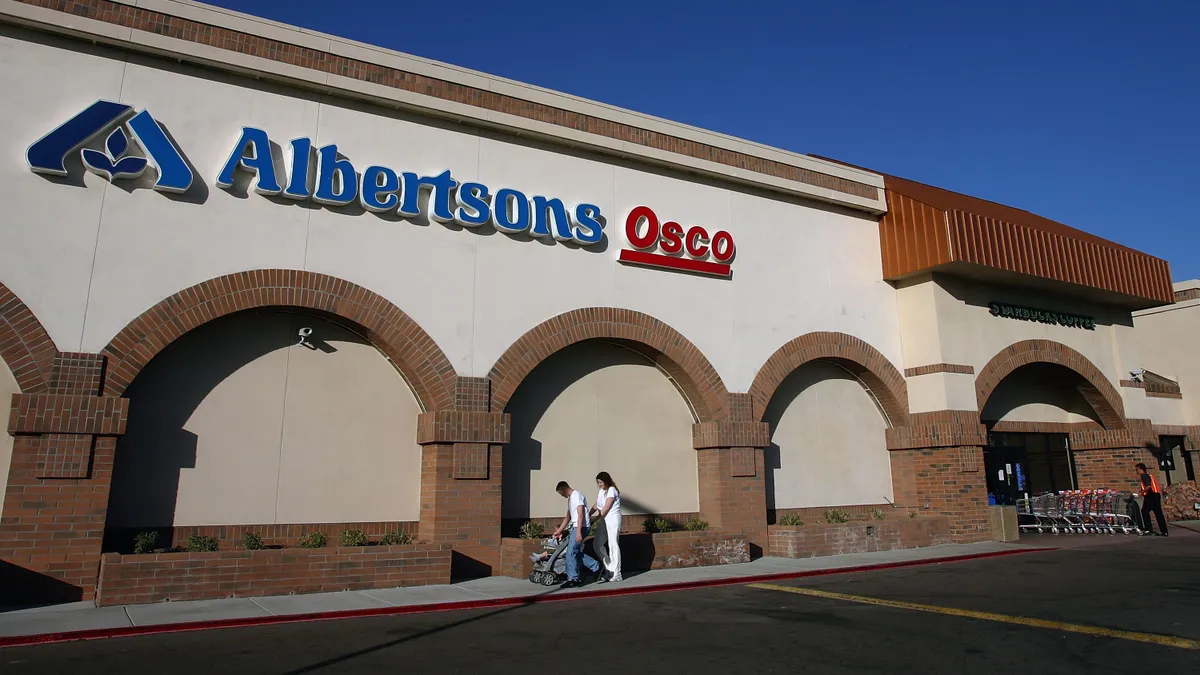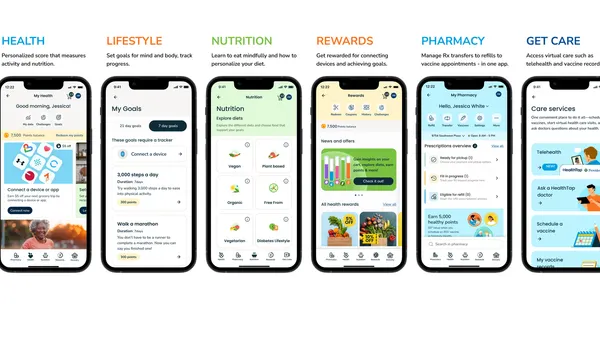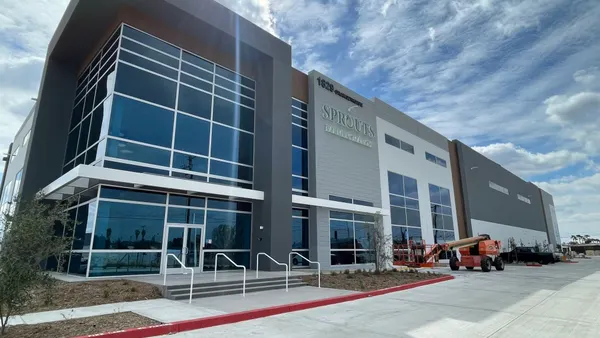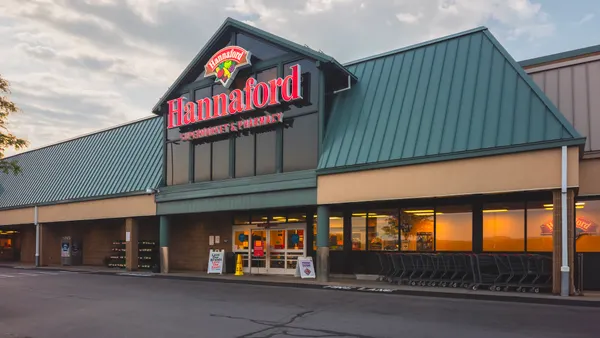Albertsons announced on Wednesday a set of Environmental Social Governance (ESG) initiatives and unveiled new sustainability targets, including a carbon reduction goal.
Called “Recipe for Change,” the ESG framework has four main pillars — planet, people, product and community — and follows other major retailers in the grocery space, notably Kroger and Walmart, that have announced and extensively promoted their social and sustainability targets in recent years.
Suzanne Long, Albertsons' chief sustainability and transformation officer, said the grocery chain has long worked on sustainability initiatives, but — until now — has been less public about its efforts.
"I think it's important to me that people know we're not new to the sustainability space. But we want to make sure we're stepping into the spotlight and making sure that we're helping people understand the big ambitious goals that we've set and that we are intent on delivering them," said Long, noting the company has enacted 2,500 energy savings projects in the last few years, including LED lighting and putting doors on refrigerated cases.
The company, which operates more than 2,250 stores across 24 banners in 34 states and Washington, D.C., noted in its most recent ESG report that it completed an assessment in 2020 that helped determine high-priority areas to serve as the foundation for its ESG strategy. Last April, the company said it planned to submit goals to the Science Based Targets initiative (SBTi) that align the chain with the Paris Climate Agreement.
As part of the ESG framework announcement, Albertsons has unveiled new targets, including a 47% carbon reduction from its own operations by 2030, which Long said is against a 2019 baseline; zero food waste going to landfills by 2030; and net-zero emissions in its own operations by 2040.
Albertsons also pledged to increase "diverse representation" among its management ranks, provide 1 billion meals to people facing food insecurity by 2030 and restated its goal of making private label packaging 100% recyclable, reusable or compostable by 2025.
Grocery Dive talked with Long, who became Albertsons' first chief sustainability officer last fall and has headed up Albertsons’ ESG efforts since late 2020, about how the grocery chain aims to tackle its goals, the challenges it sees ahead, and what investors and consumers can expect in terms of transparency with the company’s sustainability progress.
This interview has been edited for clarity and brevity.
GROCERY DIVE: What was the impetus behind setting science-based targets for Albertsons' carbon reduction?
SUZANNE LONG: I would say that the inspiration came from recognizing that as a big player in our industry and a big player in general, that we need to make sure that we're doing our part in reducing our carbon footprint and that we need to take a science-based approach. To do that we need to use a standardized way of both measuring our current performance and, ultimately, where we need to go and we knew that having an SBTi-approved goal was the way to get there.
Can you provide more insight into how those new targets got set? What did that process look like?
It's a very robust process. It's a lot of data. We used a third party to help us make sure that we were accounting for our footprint correctly. We actually report to the CDP [an international non-profit that helps companies and cities disclose their environmental impact] annually and so we've always had that calculation, and that's also audited by a third party.
But for setting our future ambitions, we brought in experts. We had to collect a lot of data about how we perform today, whether it's around our energy footprint, the amount of refrigerants we use, the type of goods that we sell and so we gathered all of that and we did an analysis to be able to break down our Scope 1, 2 and 3 footprint. And then we went about an exercise to say, "Okay, if we want to change the slope of the amount of energy, what are the various ways in which we can do that?"
To think about it for at least Albertsons — and this is pretty consistent with the industry — but 86% of our Scope 1 and 2 emissions are from refrigeration and energy use, and it's pretty equally divided between those things. We were able to determine the number of things that we could do to change our carbon trajectory by influencing primarily those two areas, that includes things like putting doors on refrigerated cases [and adding] LED lights.
I’m curious to hear about how Albertsons aims to achieve these targets. For example, I saw Albertsons made an agreement last summer for a solar energy project for its stores in Maine. I’ve heard renewables can be a pretty significant way to help cut back emissions.
That's absolutely right. So we actually have a team internally that does energy procurement and looks specifically for opportunities for how to most effectively purchase power and one of those ways is, in fact, renewable energy. And that can be through renewable energy credits, looking for opportunities to actually tap directly into solar opportunities, though those are still really an emerging area, and looking at power purchase agreements.
What are you seeing as the main obstacles ahead?
There's a few. One, for example in the short term, is the supply chain makes it really challenging because you are having to try and source equipment that is hard to find, or literally on a slow boat over to the U.S. It's not keeping us from reaching our goals, but it's making us have to work harder to make sure those items get in within the timeframe we like.
In the longer term, I think it's really two primary things. One is, I think our vendors are going to have to change with us. So when you think about our footprint, for example, especially in Scope 3, the goods we sell, we need our vendors to sign up for science-based targets in order for us to achieve our ambition. Now, the good news is we're not the only company asking them to do that. Target, Walmart, Kroger — we're all asking a lot of the same vendors to do that, so there's a mass push for it. And many of them have declared it, but many have not, and we still need to get them on board.
The second thing I would say is, I can't name another scenario where someone asks you to look out 10 and 20 years and not just set a goal, but tell you exactly how you're going to achieve that goal. But that's exactly what we're doing here. We need innovation in the outer years of this to be able to enable companies to achieve this.
How does ESG fit into Albertsons’ overall strategy? Given that the grocer created the chief sustainability officer role in recent months, what does that signal for the company going forward on its sustainability efforts?
I think a lot of companies look at sustainability as an area of cost for their business. I think the magic of what Albertsons has done in bringing these two roles [of sustainability and transformation] together is that transformation is about driving productivity in our business. How can we get the same or more for less spent right? In sustainability, there are a lot of areas where when we're driving what is more sustainable for the planet, it's actually creating a more sustainable financial environment for us. If I use less energy, or if I use more renewable energy, that's lower cost and then I can save money in our business and we can be reinvesting that into our growth.
Then in those cases where we actually have to invest in sustainability that doesn't have as good of a [return on investment], we have captured the savings from these other areas in the business that we can put into sustainability. So it becomes this self-propelling engine and you don't feel that tension that some companies do between saving money and spending money.
What does it look like internally building Albertsons' ESG expertise?
We actually have been in the sustainability space for years and done so much work already. We just haven't shouted about it as much and we haven't been as targeted in our focus and our goals. So that's really the nuance there. We have a lot of this capability already built internally. We have teams that work on energy operations and teams working on our plastics and packaging and how we reduce that footprint.
One of the things that we really believe in is that the way to bring this to life is not to create a large separate team that worries about sustainability, but to integrate sustainability into our operations directly. So the team that makes decisions around plastics and packaging makes sure that sustainability is a part of how they operate. It becomes much more about weaving it into the fabric of the business rather than trying to layer it on top.
Are you seeing any changes from investors or consumers on how much public-facing information they want on ESG targets?
I think that everyone [has gotten] a call to action on this. And I am so proud that I work for a company that was already doing so much in this space and that we were able to then tailor that work as opposed to feeling like we were starting from scratch. We are definitely getting more inquiries from investors on this. We do get questions also from customers and associates.
For Albertsons’ ESG reports, the company has said the upcoming one will get released this summer. Can you shed any light on what will be there in terms of data transparency compared to previous reports?
We will definitely be sharing more transparent information in our ESG reports going forward. It will be an evolution, not a revolution, because we want to make sure that we're sharing the data as it becomes available and that we're sharing it against our goals. But that we are also making sure that everything we're sharing is the right information.
Will you be sharing information about Albertsons' Scope 1, 2 and 3 emissions publicly in your upcoming ESG report?
I don't know specifically how detailed we'll get in the report yet because we're still working on that. But I imagine that we will share more data than has been seen in the past. The level of granularity just has yet to be determined.
How does Albertsons think about “green-washing” when it comes to sharing sustainability efforts publicly?
We think about it a lot. And actually, it was one of the questions that we discussed with our board of directors because they also want to make sure that we're doing the right thing, and that we're not just saying something to be able to get credit for it.
I think the difficulty with green-washing is there's a lot of different definitions of it, to be very frank. Some people believe that if you're legislated, for example, to do something, you shouldn't get credit for actually making that change. Well, that's true, except you are in fact reducing your carbon footprint, for example, by changing out the refrigerants that were legislated. Recording that you did that — is that green-washing? But we're very intent on making sure that everything that we do has authenticity behind it and that when we say we're making an improvement, it is that we've actually improved our performance from how it used to be.












